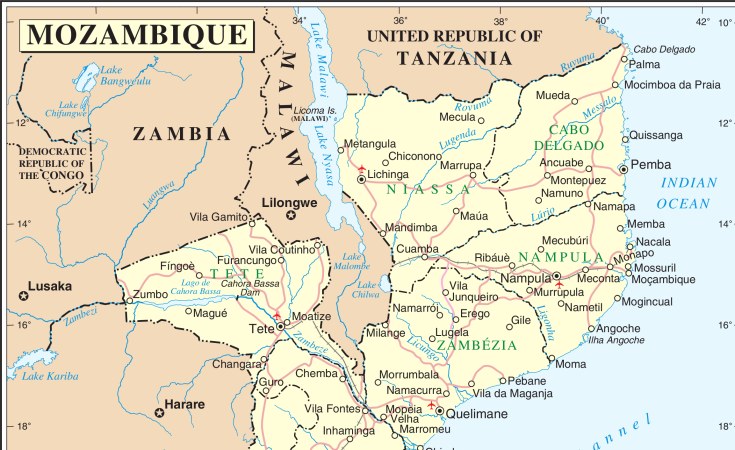TotalEnergies Patrick Pouyanne on Friday 3 February visited Palma and Mocimba da Praia towns and the Afungi gas site and then met President Filipe Nyusi in Pemba. Pouyanne's message was hard, and he named an eminent French humanitarian and intellectual, Jean-Christophe Rufin, to work with the Mozambicans.
"Since 2021, the situation in Cabo Delgado province has improved significantly, thanks in particular to the support provided by the African countries that committed themselves to restore peace and security," said Pouyanne. However "The lifting of the force majeure and the resumption of activities at the Mozambique LNG project site require, in particular, the restoration of security in the region, the resumption of public services and the return to normal life for the people of the region.
"The mission entrusted to Jean-Christophe Rufin should enable Mozambique LNG's partners to assess whether the current situation allows for a resumption of activities while respecting human rights." He must report by the end of February. https://totalenergies.com/media/news/press-releases/mozambique-lng-totalenergies-entrusts-jean-christophe-rufin-independent
The choice of Rufin is very interesting in several respects. He is a doctor and was Vice President of Medecins Sans Frontières, President of Action Against Hunger, advisor to the French Minister of Defence in charge of peacekeeping operations from 1993 to 1994, and French Ambassador to Senegal and Gambia. Most importantly, he knows both war and humanitarianism, and could negotiate a resumption of the gas while the war continues, but under strict conditions.
Rufin is also a novelist and one of his novels will give him a special understanding of the Mozambican leadership today. The book is The Dream Maker about Jacques Coeur, the 15 th century argentier or royal bursar to Charles VII, charged with providing goods, especially luxury goods, to the royal household. https://h-france.net/fffh/maybe-missed/the-making-of-a-modern-man-jean-christophe-rufins-jacques-coeur/
A review notes that Rufin casts Coeur as "essentially a modern man inserted into the fifteenth century who rejects contemporary value systems for a new understanding of the power of money and commerce to reorder human relations." He uses his power to gain control of trade and become France's wealthiest man in a "world of princes and lords, the men who had brought the country to a state of ruin." Rufin should find Mozambique's political and economic elite surprisingly similar to his research for this novel.
Rufin has a huge challenge. First he must negotiate to bend the lesser economic powers of Mozambique to the will of the stronger economic power of Total. But from his humanitarian background, he will know he must convince Mozambique's "princes and lords" to allow more of the wealth and power to trickle down to the poor local residents,.
He may have a long way to go in his month to crack Mozambican beliefs in their own myths, particularly about the possibility of a military victory. The official statement of the Mineral and Energy Ministry (3 Feb) quoted the first part of Pouyanne's statement, about the Rwandan effectiveness in improving the war situation, but did not quote the rest of the statement setting out the difficult conditions for normality and security. Yet again it gives the false impression that TotalEnergies thinks there is a military solution.
Nevertheless Pouyanne's and Rufin's influence may have already been behind President Nyusi's admission on the same day as the visit.
A first step to negotiations?
Nyusi says insurgency head is Mozambican
The leader of the insurgents is a Mozambican national named Abu Sorraca, also known as Bin Omar, President Filipe Nyusi told diplomats at a reception on Thursday (3 Feb). Abu Sorraca, he said, "is assisted by foreign citizens and we have the names of Tanzanians who are with him".
In effect, Nyusi is confirming that this is a local war, led by named, identifiable and locally known people. Researchers have been reporting this for some time but Frelimo denied it.
Swahili speaking coastal people in Tanzania and Mozambique have family links going back more than a century. People on the other side of the ignored border are not considered foreigners.
This is a dramatic change in the official line, which previously was that leaders were faceless and nameless, and thus there could be no negotiation because they could not identify people to talk to. There were also attempts to blame some foreign hidden hand - never named but IS was called to mind.
Some in Frelimo have been calling for negotiations, and former President Joaquim Chissano has been involved in back channel discussions and making contacts important for negotiations.
Nyusi's dramatic change to admitting that this is a local war opens the way for more of these back channel contacts and possible peace talks.


